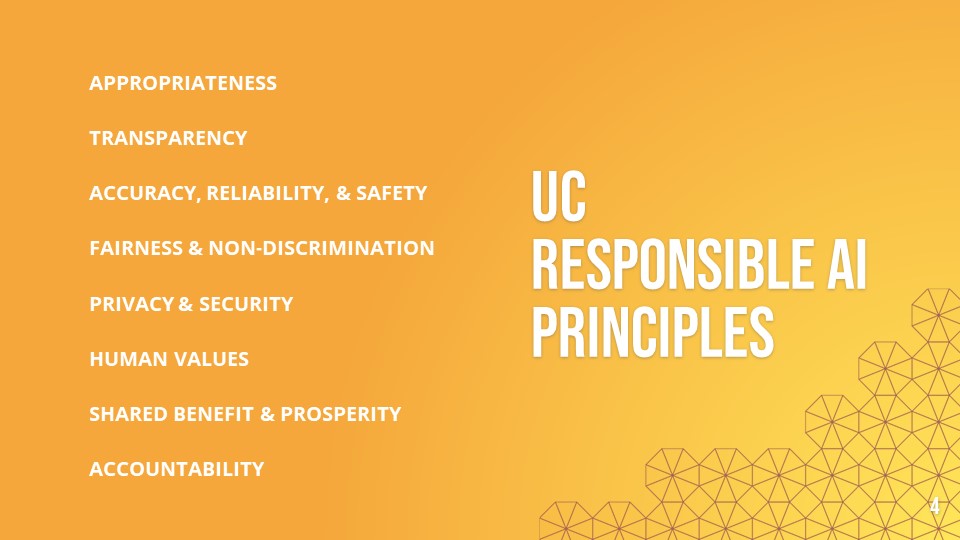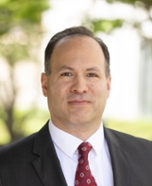Ethics, Compliance and Audit Services
Presidential Working Group on Artificial Intelligence
Acknowledgments
|
Special thanks to CITRIS Policy Lab Research Assistants Shalin Brahmbhatt and Gurbir Singh and to CITRIS Policy Lab Director, Brandie Nonnecke, for leading the writing and design of this report. |
 |

University of California Presidential Working Group on
Artificial Intelligence
INDEX
Mission & Strategic GoalsPresidential Working Group on Artificial Intelligence Co-Chairs
Working Group Members
- Health Subcommittee
- Human Resources Subcommittee
- Policing Subcommittee
- Student Experience Subcommittee
Artificial Intelligence Resources
Mission & Strategic Goals
Make further recommendations on appropriate data stewardship standards for UC data that may be used in the development and use of AI-enabled tools and systems.
Create the foundation for a permanent council that will further the principles, standards, methods, and mechanisms developed by this working group to counter the potentially harmful effects of AI and strengthen positive outcomes within the UC system.
Presidential Working Group on Artificial Intelligence Co-Chairs

Brandie Nonnecke, PhD is Founding Director of the CITRIS Policy Lab, headquartered at UC Berkeley. Brandie has expertise in information and communication technology (ICT) policy and internet governance. She studies human rights at the intersection of law, policy, and emerging technologies with her current work focusing on fairness, accountability, and appropriate governance mechanisms for AI. She is a Technology and Human Rights Fellow at the Carr Center for Human Rights Policy at the Harvard Kennedy School. She served as a fellow at the Aspen Institute’s Tech Policy Hub and at the World Economic Forum on the Council on the Future of the Digital Economy and Society. She was selected as a 2018 RightsCon Young Leader in Human Rights in Tech and received the 2019 Emerging Scholar Award at the 15th Intl. Common Ground Conference on Technology, Knowledge, and Society. Her research has been featured in Wired, NPR, BBC News, MIT Technology Review, Buzzfeed News, among others. Her research publications, op-eds, and presentations are available at nonnecke.com.

Stuart Russell received his B.A. with first-class honours in physics from Oxford University in 1982 and his Ph.D. in computer science from Stanford in 1986. He then joined the faculty of the University of California at Berkeley, where he is Professor (and formerly Chair) of Electrical Engineering and Computer Sciences, holder of the Smith-Zadeh Chair in Engineering, and Director of the Center for Human-Compatible AI. He has served as an Adjunct Professor of Neurological Surgery at UC San Francisco and as Vice-Chair of the World Economic Forum's Council on AI and Robotics. He is a recipient of the Presidential Young Investigator Award of the National Science Foundation, the IJCAI Computers and Thought Award, the World Technology Award (Policy category), the Mitchell Prize of the American Statistical Association, the Feigenbaum Prize of the Association for the Advancement of Artificial Intelligence, and Outstanding Educator Awards from both ACM and AAAI. From 2012 to 2014 he held the Chaire Blaise Pascal in Paris, and he has been awarded the Andrew Carnegie Fellowship for 2019 to 2021. He is an Honorary Fellow of Wadham College, Oxford; Distinguished Fellow of the Stanford Institute for Human-Centered AI; Associate Fellow of the Royal Institute for International Affairs (Chatham House); and Fellow of the Association for the Advancement of Artificial Intelligence, the Association for Computing Machinery, and the American Association for the Advancement of Science. His book "Artificial Intelligence: A Modern Approach" (with Peter Norvig) is the standard text in AI; it has been translated into 14 languages and is used in over 1400 universities in 128 countries. His research covers a wide range of topics in artificial intelligence including machine learning, probabilistic reasoning, knowledge representation, planning, real-time decision making, multitarget tracking, computer vision, computational physiology, and philosophical foundations. He also works for the United Nations, developing a new global seismic monitoring system for the nuclear-test-ban treaty. His current concerns include the threat of autonomous weapons and the long-term future of artificial intelligence and its relation to humanity. The latter topic is the subject of his new book, "Human Compatible: AI and the Problem of Control" (Viking/Pengun, 2019).

Alexander A. Bustamante is the Senior Vice President and Chief Compliance and Audit Officer for the University of California system and leads the Office of Ethics, Compliance and Audit Services (Ethics, Compliance and Audit Services). He is responsible for developing and overseeing the University's corporate compliance, investigative and audit programs. The University is facing a range of complex and varying compliance issues in many different disciplines. Most recently, he and his team have dedicated significant effort to current and emerging compliance issues related to foreign influence and emergent technology (Foreign Influence | UCOP). Ethics, Compliance and Audit Services routinely conducts cyber-risk focused audits, including technical vulnerability assessments and penetration testing across the system in an effort to strengthen UC’s critical infrastructure, protect federally funded research, and safeguard UC’s large data sets used for research involving in machine learning and artificial intelligence (e.g., Center for Data-driven Insights and Innovations (CDI2) | UCOP). Prior to coming to the University of California, Mr. Bustamante served as the Inspector General for the Los Angeles Police Department (LAPD), where he was responsible for providing independent oversight of the Department, its operations and its approximately 12,000 employees. As the Inspector General, he routinely examined the Department’s use of AI-enabled systems and its impact on the community, including LAPD’s use of Predictive Policing to assist in identifying locations for focused officer deployment as well as Early Warning Systems designed to identify officers requiring additional supervision, training or discipline. Bustamante served as an Assistant United States Attorney for the Central District of California from 2002 to 2011, where he was the recipient of various local, state, and national awards for excellence, including the United States Attorney General's Award for Exceptional Service, the Department of Justice’s highest award, for handling a landmark case involving the federal government’s first use of civil rights statutes to combat racially-motivated gang violence against African-Americans. He started his career in 1997 as a Judge Advocate General for the United States Army, where he provided legal advice to senior military commanders and their staffs and represented the Army in criminal investigations and prosecutions. He deployed to Kosovo, where he assisted the United Nations and nongovernmental organizations in developing political and judicial infrastructure for the region, and coordinated genocide investigations with representatives of the Criminal Tribunal for the former Yugoslavia. He received his Juris Doctor degree from the George Washington University Law School and his Bachelor's Degree in Rhetoric from the University of California, Berkeley.
Working Group Members
Health Subcommittee
Human Resources Subcommittee
Policing Subcommittee
Student Experience Subcommittee
Health
Ken GoldbergKen Goldberg is William S. Floyd Distinguished Chair of Engineering at UC Berkeley. Ken leads research in robotics, machine learning and AI. He is Professor of Industrial Engineering and Operations Research at UC Berkeley, with appointments in Electrical Engineering, Computer Science, Art Practice, the School of Information and UCSF Radiation Oncology. Ken is Director of the CITRIS "People and Robots" Initiative (75 faculty across 4 UC campuses) and past Editor-in-Chief of the IEEE Transactions on Automation Science and Engineering (T-ASE) and has published over 300 refereed papers. He was awarded nine US patents, the NSF Presidential Faculty Fellowship (PECASE 1995), the Joseph Engelberger Award (top honor in Robotics, 2000), the IEEE Major Educational Innovation Award (2001), and elected IEEE Fellow in 2005.
Cora HanCora Han is the Chief Health Data Officer for UC Health, University of California, Office of the President. Prior to her role at UC, Cora held senior positions at the Federal Trade Commission as Senior Attorney, Division of Privacy and Identity Protection. Cora received her Juris Doctorate from the University of Chicago Law School and her BA from Harvard University.
Hillary Noll KalayHillary Noll Kalay is Senior Counsel in the Health Affairs and Technology Law group of the Office of General Counsel. Hillary provides guidance on clinical research matters, data initiatives, U.S. and international privacy laws, and supports UC Health procurement. Prior to joining OGC, Hillary served as Research Policy Manager for the University’s Research Policy Analysis and Coordination unit, developing University policy on clinical research and negotiating and advising campuses on clinical research agreements. Prior to joining the University, she practiced intellectual property litigation at Bay Area law forms. Hillary is a graduate of the University of California, Berkeley (BA, MPP), and New York University School of Law (JD).
Sonia KatyalProfessor Sonia Katyal’s work focuses on the intersection of technology, intellectual property, and civil rights (including anti-discrimination, privacy, and freedom of speech). Her past articles have focused on the relationship between artificial intelligence, civil rights, and private industry; software and trade secrecy, and issues of transparency and bias against minorities. Professor Katyal has won several awards for her work; most recently, her article, The Paradox of Source Code Secrecy, was selected for inclusion in the Best Intellectual Property articles of 2019. During the Obama administration, Katyal was selected by U.S. Commerce Secretary Penny Pritzker to be part of the inaugural U.S. Commerce Department’s Digital Economy Board of Advisors.
Barbara KoenigBarbara A. Koenig, Ph.D., is the Director of the UCSF Program in Bioethics, a program that spans ethics research, clinical ethics, and ethics education across the university. Prof. Koenig pioneered the use of empirical methods in the study of ethical questions in science, medicine, and health. Her current focus is on emerging genomic technologies and using deliberative democracy to engage communities about scientific governance, including the use of AI in healthcare. Prof. Koenig previously led bioethics centers at Stanford University and the Mayo Clinic.
Yang LiuYang Liu is currently an Assistant Professor of Computer Science and Engineering at UC Santa Cruz. He was previously a postdoctoral fellow at Harvard University. He obtained his PhD degree from the Department of EECS, University of Michigan, Ann Arbor in 2015. He is interested in how we can build models using incomplete and imperfect data, how we can obtain higher quality data from crowdsourcing, and how we can leverage the above solutions to build models that are fair in real-world applications, despite the potential noise and bias that exist in the data. His works have seen applications in high-profile projects, such as the Hybrid Forecasting Competition organized by IARPA, and Systematizing Confidence in Open Research and Evidence (SCORE) organized by DARPA.
Camille Nebeker, EdD, MS, is an Associate Professor with appointments with the UC San Diego Design Lab and the Wertheim School of Public Health. She co-founded and directs the ReCODE Health center, which provides education and consultation services to guide ethical practices in technology-supported health research. Dr. Nebeker applies a human centered design approach to shape ethical research practices (e.g., risk assessment, informed consent, return of results), which has led to development of decision support tools (see: Digital Health Checklist and Framework and Connected and Open Research Ethics platform). She serves as a member of the World Health Organization Digital Health Roster of Experts, American Association for the Advancement of Science Committee on Scientific Freedom and Responsibility, IEEE Organizational Governance of AI Working Group and the Society of Behavioral Medicine Digital Health Council. Dr. Nebeker’s research has received support from federal, foundation and industry sources including the NSF, NIH, Office of Research Integrity, RWJF and IBM. Publications related to her work are accessible via: https://escholarship.org/uc/recodehealth_publications.Jessica Newman
Jessica Newman is a Research Fellow at the UC Berkeley Center for Long-Term Cybersecurity, where she leads the AI Security Initiative, a hub for interdisciplinary research on the global security implications of artificial intelligence. She is also an AI Policy Specialist with the Future of Life Institute and a Research Advisor with The Future Society. Jessica was a 2016-17 International and Global Affairs Student Fellow at Harvard's Belfer Center, and has held research positions with Harvard's Program on Science, Technology & Society, the Institute for the Future, and the Center for Genetics and Society. Jessica received her master’s degree in public policy from the Harvard Kennedy School and her bachelor’s in anthropology from the University of California, Berkeley with highest distinction honors. She has published dozens of articles on the implications of emerging technologies in outlets including The Hill, The Los Angeles Times, and The Pharmaceutical Journal. Jessica is a member of the OECD Network of Experts on AI (ONE AI), the CNAS AI Task Force, and the Partnership on AI Expert Group on Fair, Transparent, and Accountable AI.
Lawrence SaulLawrence Saul is a Professor and Vice Chair in the Department of Computer Science and Engineering at UC San Diego. His main research interests are in machine learning and high dimensional data analysis. He served previously as the Editor-In-Chief of the Journal of Machine Learning Research. He received his Ph.D. in Physics from M.I.T. and worked previously at AT&T Labs and the University of Pennsylvania.
Human Resources
Mark Cianca, Human Resources Subcommittee Co-ChairMark Cianca serves in concurrent roles for the University of California as Interim Vice President and Chief Information Officer, and Associate Vice President, Operational Services. In the CIO role, he is responsible for championing the work of over 8000 information technology professionals across all UC locations. Focal areas include diversity, equity and inclusion in the IT workforce, cybersecurity management of UC data assets, and promoting IT best practices systemwide in our COVID-19 response. As Associate Vice President of Operational Services, Cianca champions the University’s strategic priorities for business efficiencies and for expanding shared systems and services to manage administrative costs. He led the University of California’s historic UCPath business transformation initiative which completed its rollout to all UC campuses and medical centers in 2020.
Alexa Koenig, Human Resources Subcommittee Co-ChairAlexa Koenig, PhD, JD, is the Executive Director of the Human Rights Center (winner of the 2015 MacArthur Award for Creative and Effective Institutions) and a lecturer at UC Berkeley School of Law, where she teaches classes on human rights and international criminal law with a particular focus on the impact of emerging technologies on human rights practice. She co-founded the Human Rights Investigations Lab, which trains students and professionals to use online open-source research methods to strengthen investigative reporting, legal investigations, and human rights advocacy. Alexa is a member of the World Economic Forum’s Global Future Council on Human Rights and Technology, the American Association for the Advancement of Science’s Committee on Scientific Freedom and Responsibility, and the Technology Advisory Board of the Office of the Prosecutor at the International Criminal Court, as well as co-chair of the International Bar Association Human Rights Law Committee’s Technology and Human Rights Working Group. Alexa has been honored with several awards for her work, including the United Nations Association-SF’s Global Human Rights Award, the Mark Bingham Award for Excellence, the Eleanor Swift Award for Public Service, and the Phi Beta Kappa Northern California Teaching Excellence Award.
Yufei DingYufei Ding joined the Department of Computer Science (with a joint appointment in the Department of Electrical & Computer Engineering), University of California at Santa Barbara as an Assistant Professor in Nov 2017. She received her Ph.D. in Computer Science from North Carolina State University, and B.S. and M.S. in Physics from the University of Science and Technology of China and the College of William and Mary, respectively. Her research interests lie in the broad fields of domain-specific language design, architecture and compiler optimization, and hardware acceleration. Her current research focuses on building high-performance, energy-efficient, and high-fidelity programming frameworks for emerging technologies such as quantum computing, machine learning, and deep learning. She was the NCSU Computer Science Outstanding Research Award in 2016 and Computer Science Outstanding Dissertation Award in 2018. She is also a recipient of the 2019 IEEE Computer Society TCHPC Early Career Researchers Award for Excellence in High-Performance Computing.
Mary GauvainMary Gauvain is Distinguished Professor of Psychology at UC Riverside and 2020-21 Chair of the UC Academic Senate. She received her B.A. in Social Ecology from UC Irvine; her M.A in Sociology in Education from Stanford; and her Ph.D. in Developmental Psychology from the University of Utah. Her scholarly interests include cognitive development in early and middle childhood, with particular attention to social and cultural contributions to the development of thinking. She investigates the development of children’s planning skills, spatial cognition, learning in- and outside of school, concept development regarding water and food contamination among children in Sub-Saharan Africa, and child development in the context of cultural change. Her research is widely published and has been funded by the National Institute of Child Health and Human Development and The Spencer Foundation, among others. She is a Fellow of the American Association for the Advancement of Science, the American Educational Research Association, the American Psychological Association, and the Association for Psychological Science.
Bill MauerBill Mauer is the Dean of the School of Social Sciences and Professor of Anthropology; Law; and Criminology, Law and Society. Professor Mauer is the Director of the Institute for Money, Technology and Financial Inclusion. He received his BA from Vassar College and his MA and PhD from Stanford University. In 2016, he was named a fellow of the American Association for the Advancement of Science . In 2018, he was named a Filene Fellow. Professor Maurer is a cultural anthropologist and sociolegal scholar. His most recent research looks at how professional communities (payments industry professionals, computer programmers and developers, legal consultants) conceptualize and build financial technology or “fintech,” and how consumers use and experience it. More broadly, his work explores the technological infrastructures and social relations of exchange and payment, from cowries to credit cards and cryptocurrencies. As an anthropologist, he is interested in the broad range of technologies people have used throughout history and across cultures to figure value and conduct transactions. He has particular expertise in alternative and experimental forms of money and finance, payment technologies, and their legal implications. He has published on topics ranging from offshore financial services to mobile phone-enabled money transfers, Islamic finance, alternative currencies, blockchain/distributed ledger systems, and the future of money.
Mark NitzbergMark Nitzberg is currently Executive Director of CHAI, as well as head of strategic outreach for Berkeley AI Research (BAIR). He advises corporations, governments and institutions on AI opportunities and impacts. Mark holds a Ph. D. in Computer Vision and Human Perception from Harvard University.
Hoyt SzeHoyt Sze joined the Office of General Counsel in 2017. Mr. Sze is Managing Counsel for the Health Law Group, specializing in regulatory and operational matters. Prior to joining the University of California, Mr. Sze was the Chief Compliance Officer and Privacy Officer for Prospect Medical Holdings, Inc., a 20-hospital health care system. Mr. Sze was previously a partner in the law firm of McDermott Will & Emery LLP, where he worked on a variety of health care matters. Prior to McDermott, Mr. Sze practiced as a Deputy Federal Public Defender in the Office of the Federal Public Defender for the Central District of California and as an associate in the law firm of Latham & Watkins in the health law group. Mr. Sze is a graduate of UC Berkeley and Cornell Law School.
Policing
Hany Farid, Policing Subcommittee Co-ChairHany Farid is a Professor at the University of California, Berkeley with a joint appointment in Electrical Engineering & Computer Sciences and the School of Information. His research focuses on digital forensics, image analysis, and human perception. He received his undergraduate degree in Computer Science and Applied Mathematics from the University of Rochester in 1989, his Ph.D. in Computer Science from the University of Pennsylvania in 1997. Following a two-year post-doctoral fellowship in Brain and Cognitive Sciences at MIT, he joined the faculty at Dartmouth College in 1999 where he remained until 2019.
Safiya Noble, Policing Subcommittee Co-ChairDr. Safiya Umoja Noble is an Associate Professor at the University of California, Los Angeles (UCLA) in the Department of Information Studies where she serves as the Co-Founder and Co-Director of the UCLA Center for Critical Internet Inquiry (C2i2). She also holds appointments in African American Studies and Gender Studies. She is a Research Associate at the Oxford Internet Institute at the University of Oxford and has been appointed as a Commissioner on the Oxford Commission on AI & Good Governance (OxCAIGG). She is a board member of the Cyber Civil Rights Initiative, serving those vulnerable to online harassment.
Kevin ConfettiAs the Deputy Chief Risk Officer for the University of California in the Office of the President, Office of Risk Services; responsible for the UC's Employment Practices, Workers' Compensation, General Liability, Auto, Property, Construction, and Hospital Professional Liability Programs that insures over 200,000 employees, 250,000 students, countless visitors & medical patients, and $50B in property value, across ten campuses, five medical centers, a national laboratory and the Office of the President.
Nadia HeningerNadia Heninger is an associate professor in Computer Science and Engineering at the University of California, San Diego. Her research focuses on applied cryptography and security, particularly cryptanalysis of public-key cryptography in practice. She is the recipient of a 2017 NSF CAREER award, and her research has won best paper awards at CCS 2016, CCS 2015, Usenix Security 2012, and a best student paper award at Usenix Security 2008. Previously, she was an assistant professor at the University of Pennsylvania. She received her Ph.D. in computer science in 2011 from Princeton and spent time as a postdoc at UC San Diego and Microsoft Research New England.
Elizabeth JohElizabeth Joh is a Professor of Law at the U.C. Davis School of Law. She is a nationally regarded scholar whose work focuses on how technology affects the powers and regulation of the police. Her scholarship has appeared in the leading law reviews and in popular media including the New York Times, the Los Angeles Times, and Slate.
Deirdre MulliganDeirdre K. Mulligan is a Professor in the School of Information at UC Berkeley, a faculty Director of the Berkeley Center for Law & Technology, a co-organizer of the Algorithmic Fairness & Opacity Working Group, an affiliated faculty on the Hewlett funded Berkeley Center for Long-Term Cybersecurity, and a faculty advisor to the Center for Technology, Society & Policy. Mulligan’s research explores legal and technical means of protecting values such as privacy, freedom of expression, and fairness in emerging technical systems.
Student Experience
Camille Crittenden, Student Experience Subcommittee Co-ChairCamille Crittenden, Ph.D., is the Executive Director of CITRIS and the Banatao Institute, and co-founder of the CITRIS Policy Lab and the Women in Tech Initiative at UC. She also chaired the California Blockchain Working Group (2019-20). Prior to coming to CITRIS in 2012, she was Executive Director of the Human Rights Center at Berkeley Law, where she helped to develop its program in human rights, technology, and new media. She has written and spoken widely on these topics, as well as technology applications for civic engagement, government transparency and accountability, and the digital divide. She held previous positions as Assistant Dean for Development with International and Area Studies at UC Berkeley and in development and public relations at University of California Press and San Francisco Opera. She earned an MA and Ph.D. from Duke University.
Liv Hassett, Student Experience Subcommittee Co-ChairLiv Hassett is Associate Campus Counsel at UC Berkeley. Liv joined Berkeley in January 2019 after close to 9 years as a campus counsel for the UC Santa Cruz campus. She advises on a variety of matters for the University, including data privacy and security, business transactions, emerging technology, research, online education and intellectual property. Liv initiated a "tech team" within UC Legal to explore the fascinating intersection of law and technologies such as blockchain and AI.
Miguel Carreira-PerpinanMiguel Á. Carreira-Perpiñán is a professor in Electrical Engineering and Computer Science at the University of California, Merced. He received the degree of "licenciado en informática" (MSc in computer science) from the Technical University of Madrid in 1995 and a PhD in computer science from the University of Sheffield in 2001. Prior to joining UC Merced, he did postdoctoral work at Georgetown University (in computational neuroscience) and the University of Toronto (in machine learning), and was an assistant professor at the Oregon Graduate Institute (Oregon Health & Science University). He is the recipient of an NSF CAREER award, a Google Faculty Research Award and best (student) paper awards at AISTATS and Interspeech. His research interests lie in machine learning and optimization, most recently in nonconvex optimization, neural net compression, and decision tree optimization.
Andrew HoustonAndrew W. Houston joined UC Legal as Counsel in July of 2017. As a member of the Business, Finance, and Innovation practice group, Mr. Houston’s practice focuses on supporting procurement systemwide. Prior to joining UC Legal, Mr. Houston was an attorney at San Francisco Bay Area Rapid Transit District (BART), where he represented the public transit agency on a variety of matters, with particular emphasis on public contracts involving construction, procurement and services. Mr. Houston earned his undergraduate degree from University of California, Berkeley, and his law degree from University of California, Hastings College of the Law.
Shanda HuntShanda currently serves as the Systemwide Research Compliance Officer at the University of California headquarters. In this leadership role, she is a thought partner to the SVP and Chief Compliance and Audit Officer on critical emerging issues in research and provides systemwide research compliance oversight in a wide variety of regulatory areas. Prior to joining the UC Office of the President, Shanda held a leadership role at a large research center, contracts officer, and research administrator roles at two UC campuses, as well as analytical and compliance management roles in the private and government sectors. Shanda received her BA in Anthropology with a focus on Genetics and Archaeology from the University of California at Berkeley and her Juris Doctorate from Berkeley Law, University of California at Berkeley.
Caroline JeanmaireCaroline Jeanmaire is the director of strategic research and partnerships at the Center for Human-Compatible AI, where she focuses on building a research community around AI safety and researching policies on AI safety and ethics. Before working there, she was an AI Policy Researcher and Project Manager at The Future Society. She notably supported the organization of the first and second Global Governance of AI Forums at the World Government Summit in Dubai. She participated in climate negotiations since 2015, including with the French Delegation for COP23 and COP24. Caroline has a Master’s degree in International Relations from Peking University and a Master’s degree in International Public Management from Sciences Po Paris. She also received her Bachelor’s degree in political sciences from Sciences Po Paris. She studied at the Graduate Fletcher School of Law and Diplomacy and at Tufts University.
Theresa Maldonado (VP Research & Innovation)Dr. Theresa A. Maldonado was appointed Vice President for Research & Innovation in March 2020. Before coming to UC, she served as Dean and Riter Professor of Engineering at The University of Texas at El Paso (UTEP) in July 2017. She also holds a tenured appointment as Professor in the Department of Electrical & Computer Engineering. Dr. Maldonado’s academic career spans 29 years, including at four other universities: The University of Texas – Rio Grande Valley, Texas A&M University, Texas A&M Health Science Center, and The University of Texas at Arlington, with nearly 20 years in various research strategic and administrative roles. She also served as Associate Vice Chancellor for Research at the Texas A&M University System and as founding director of the Texas A&M Energy Institute. Dr. Maldonado has extensive experience at the federal level in advancing engineering research, education, and commercialization initiatives. From Jan. 2011 to Oct. 2014, she served as a division director in the Engineering Directorate at the National Science Foundation (NSF). She was responsible for a $135M budget in support of interdisciplinary research centers, research translation, innovations in engineering education, special initiatives in support of military veterans, broadening participation in engineering, and workforce development programs. Her initial appointment at NSF was in 1999 to 2001, when she served as a program director in the Engineering Research Centers program and represented the Engineering Directorate on several NSF-wide committees. Before entering academia, Dr. Maldonado was a member of technical staff at AT&T Bell Laboratories for 5 1/2 years working on optical fiber components and systems. Dr. Maldonado earned the Ph.D., M.S.E.E., and B.E.E. with Highest Honors degrees in Electrical Engineering, all from the Georgia Institute of Technology. Dr. Maldonado is a registered Professional Engineer in Texas.
Artificial Intelligence Resources
Berkman Klein Center AI resources

